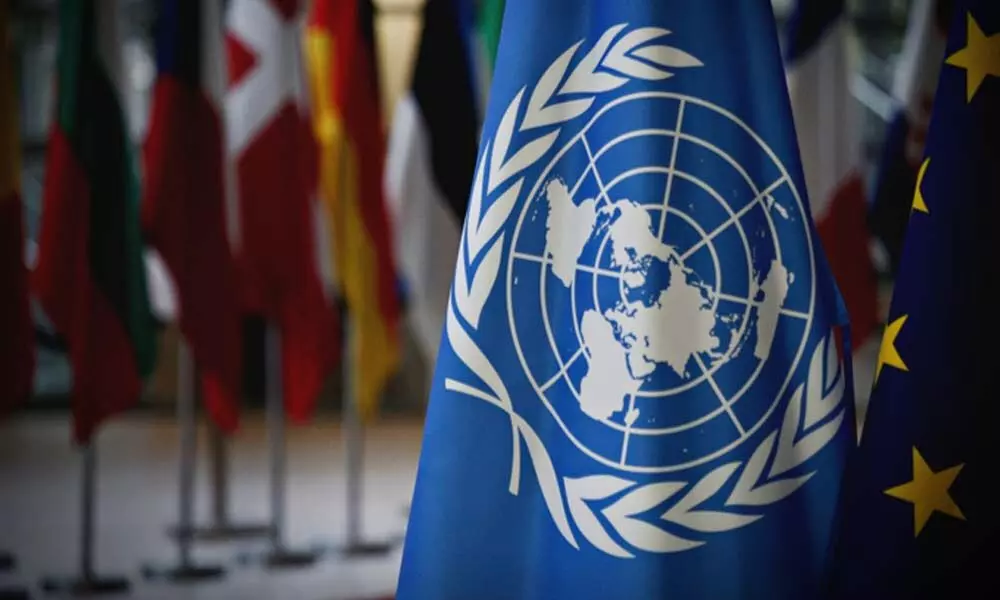How Ukraine crisis could reignite debate over effectiveness of UN
While Putin is pushing ahead with a defined strategy on how he perceives Russia in the global powerplay, the United Nations seems clueless about its responsibility in this stand-off to top it all
image for illustrative purpose

Russia's unilateral action in Ukraine demonstrates there is an urgent and immediate need to reform the UN, including restructuring the permanent membership of the UN Security Council (UNSC) to reflect the changed world order and bring in 'diversity and democracy through the implementation of a representative voting'
The Russian juggernaut that encircles Ukraine from three sides, with an estimated 1,50,000 troops ready for a 'full-scale invasion,' has left the world leaders playing the guessing game about the next move by Russian President Vladimir Putin. Meanwhile, President Putin employed Chinese salami-slicing tactics on Eastern Ukraine to eat away chunks of land. The global leaders, including US President Joe Biden and British Prime Minister Boris Johnson, are calling Moscow's latest move the beginning of 'full-scale invasion' of the country.
By recognising two breakaway provinces, Donetsk and Luhansk, of East Ukraine, as independent and sovereign nations, President Putin has unleashed a new diplomatic assault on the EU. His unilateral move challenges the efficacy of NATO and the United Nations in particular.
After World War II, the UN was established to replace 'the ineffective League of Nations' to prevent future wars. However, the organisation has failed to maintain international peace and security on many occasions.
Moscow has 'blatantly and violently' broken international laws and principles that has pushed Europe on the verge of a 'full-scale conflict' that it has not witnessed since World War II.
Though, the UN Secretary-General Antonio Guterres, did call-out President Putin for his action in Ukraine when he said Russia violated the 'territorial integrity and sovereignty of Ukraine as well as the UN charter.' But, the world expects more than just a statement from an international organisation that represents 193 countries which is 'almost all of the world's sovereign states.' Ukraine, an independent nation, lost large chunks of land to mercenary forces, and the United Nations cannot be a mere spectator. Russia's latest move would certainly have international consequences and thus needs a global solution led by the UN.
So the question is; has the UN lost its relevance? And is it heading towards the same fate as the League of Nations?
While Moscow's chess game includes diplomatic and military manoeuvres, NATO, on the other hand, seems to be pinning its hopes on diplomacy and financial arm-twisting to check President Putin, and both are not working. This explains why Putin props up separatists within Donetsk and Luhansk and then immediately recognises their 'independence and sovereignty by way of signing decrees.' Then, he completed the international coup by deploying Russian 'peacekeepers' to support the separatists to 'maintain peace,' as he called it.
While President Putin is pushing ahead with a defined strategy on how he perceives Russia in the global powerplay, even if it means taking the world back to the cold-war era of the '90s, the West seems to have no counter-strategy to check Russia. Moreover, the United Nations seems clueless about its responsibility in this stand-off to top it all.
NATO, which includes three of five permanent security council members, failed in putting up a credible and united deterrence to Moscow's unilateral action in Ukraine. This demonstrates an urgent and immediate need to reform the UN, including restructuring the permanent membership of the UN Security Council (UNSC) to reflect the changed world order and bring in 'diversity and democracy through the implementation of a representative voting.'
Putin's view of what is or should be the arc of Russian influence has pushed Europe on the verge of a 'full-scale conflict.' Time will tell if the Ukraine conflict will trigger the geopolitical clock back to the Cold War period.
(The author is Founder, MyStartup TV)

